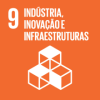
European Leadership Highlighted Through Participation in Four COST Actions
Projects foster innovation in sustainability, urban planning, mental health, and professional development
Sustainable Development Goals (SDG)



Lusófona University submitted five applications to the COST – European Cooperation in Science and Technology initiative, with four being approved, reinforcing its prominent position in the European research and innovation landscape.
Among the approved projects, Lusófona University coordinates two actions led by its research centres CeiED and TerrA.ID. The project "Connecting Critical Pedagogies, Inclusive Art Forms and Alternative Barometers for Urban Sustainability," spearheaded by CeiED, involves 16 countries and is part of the Socio-Artistic Studies Network for Decoloniality and Sustainability (ReLeCo). This initiative aims to develop an innovative methodology to promote more circular and sustainable cities through co-creation and the exchange of diverse knowledge, including ancestral and indigenous wisdom. This approach seeks to overcome Eurocentric perspectives and identify local and creative strategies, using artistic practices to foster thematic solutions. The project will be applied to three areas of urban circular economy: food systems, housing, and public spaces.
The project "Architectural and Urban Ambiances of European Cities," led by TerrA.ID and involving 18 countries, focuses on improving quality of life in urban environments. By emphasising the sensory experiences of users, this action aims to address habitability issues, promoting solutions that integrate more humanised and participatory design approaches in urban planning.
In addition to coordinating these two actions, Lusófona University participates in two other projects approved in this cycle. The project "Critical Perspectives on Career and Career Guidance," led by Norway and involving 29 countries, explores transformations in contemporary careers, analysing the necessary responses from public policies and practices. This project fosters collaboration among researchers, policymakers, and practitioners, encouraging the inclusion of researchers from less-represented countries.
Finally, the project "Climate Change Impacts on Mental Health in Europe (CliMent)," led by Portugal and involving 28 countries, examines the relationship between climate change and mental health, an under-researched area. This action seeks to understand the impacts of climate change on mental health, develop coping strategies, implement behavioural interventions, and promote long-term sustainable solutions. This project aims to empower professionals, educators, and citizens, strengthening social and individual well-being in the face of climate challenges.
Lusófona University thus continues to stand out for its commitment to excellence in research and international cooperation, contributing to innovative solutions addressing global challenges in sustainability, urban planning, professional development, and mental health.
Related Courses
Other News
- ‘Heritage Remixed’ - EPIC-WE's Fourth Game Jam in Óbidos
- Open Day: Cinema as an academic pathway at Lusófona University
- CresCine Launches Volume 2 of the State of European Film in Small Markets Report
- A Window to Higher Education at ULusófona Open Day
- Conference Highlights Digitalisation, Business and Sustainability










